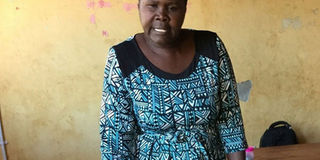28 years of teaching visually impaired pupils

Vicky Alice Kidega says giving hope to visually-impaired pupils has given her a fulfilling career. Photo Polycarp Kalokwera
What you need to know:
- When she taught a class that had four visually impaired pupils, Vicky Alice Kidega’s life was mesmerised by how bright they were. As such, she made a decision to teach visually impaired pupils, a job she has been at for 28 years now.
Given chance most teachers would not choose to teach visually-impaired pupils. And in fact very few take on special needs education at higher institutions of learning. But that is not so for Vicky Alice Kidega, 66, who for 28 years has been teaching visually-impaired pupils at Gulu Primary School, Blind Annex
Visual impairment is a severe reduction in vision that cannot be corrected with standard glasses or contact lenses and reduces the ability of someone’s eyes to function normally.
Kidega, a teacher of the English Language, says her call came way back in 1990 after being challenged by the brilliance of four Primary Two visually-impaired pupils while conducting a lesson. She said whenever she asked questions, these pupils were exceptional in their performances.
“I became concerned and challenged at how brilliant they were yet visually-impaired. In my life at the time I had never seen visually-impaired children being taken to school,” Kidega says.
Turning point
Taking keen interest in how they were able to learn, these pupils took her through the basics on how to read and write using the braille for one week and that was her turning point, she says. And although Kidega enrolled for a Diploma in Special Needs Education at Kyambogo University in 1992, that encounter was everything to her.
But her education journey began in 1969 from Shimoni Demonstration School in Kampala. However, she sat her Primary Leaving Examination from St. Joseph’s School, Gulu in 1976.
Kidega later joined Kitgum Mixed High School for her O-Level from 1977 to 1980 after which she joined Christ the King Primary Teachers College, Gulu from 1983 to 1985 where she attained a Grade III certificate in primary education.
“I got my first job in May 1985 at Bobi Primary School which was far away from Gulu Town but could not take it up due to the civil war in the northern region at the time,” she says.
She adds that she instead accepted to teach at St Joseph’s Primary School that same month due to its closeness to Gulu Town, but the situation became unbearable in 1986 when the Lord Resistance Army and Uganda People’s Defence Forces engaged in the long war that lasted for more than two decades.
While in class, Kidega attends to each child and takes them through the lessons at their own pace. She teaches from Primary One to Primary Seven due to the inadequate number of teachers at the school.
“There are a total of 47 visually-impaired children in the school and we are only seven teachers to cover all the subjects,” Kidega states.
Achievements
“The last 28 years I have spent teaching visually-impaired children are my greatest achievement,” she said, adding: “Many visually-impaired children have succeeded because of my services even those who were abandoned by their parents.”
Despite the achievements, Kidega says the negative attitude from both teachers and parents towards educating special needs children has been her greatest challenge. “Many people have not yet realised that poor or no sight at all does not mean being intellectually incapacitated. These children are bright when given ample time,” she said.
The poor attitude aside, Kidega adds that inadequate visual-impaired learning equipment such as braille kits and paper, cubes, cube frames and others are expensive. “We still lack enough classrooms. For instance Primary One, Two and Three share a class with three different lessons going on. In most cases children get distracted by the lessons of their colleagues,” she said.
“People become great not because of their sight but because of the vision and intellectual ability. Parents and communities should grant visually-impaired children and other physically-challenged children equal opportunities,” she advised.
Echoing words of Margaret Thatcher, the first UK female prime minister, Kidega says, “people think being born blind is a curse but it is so much a curse to be born with sight, but without vision.”



